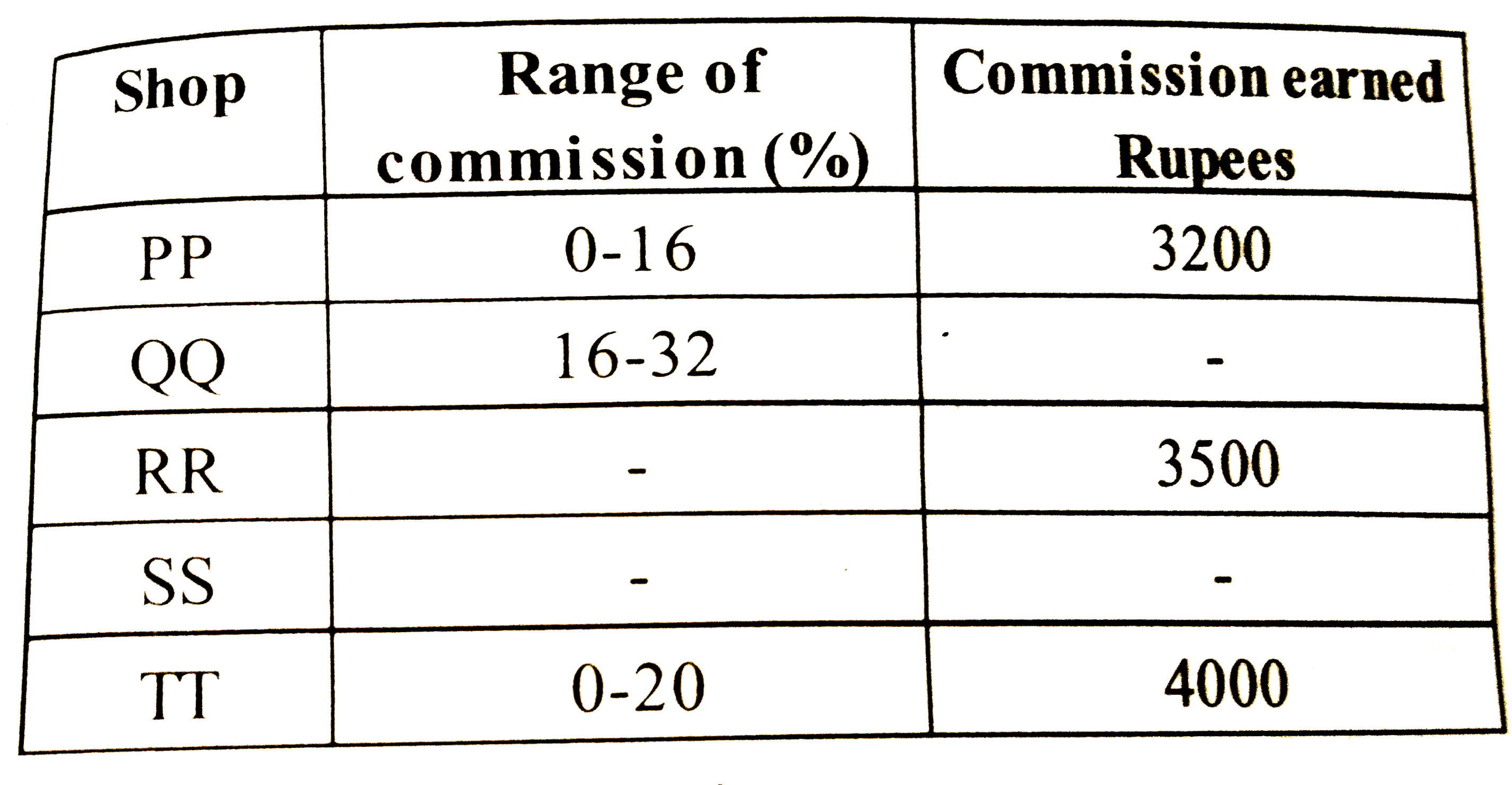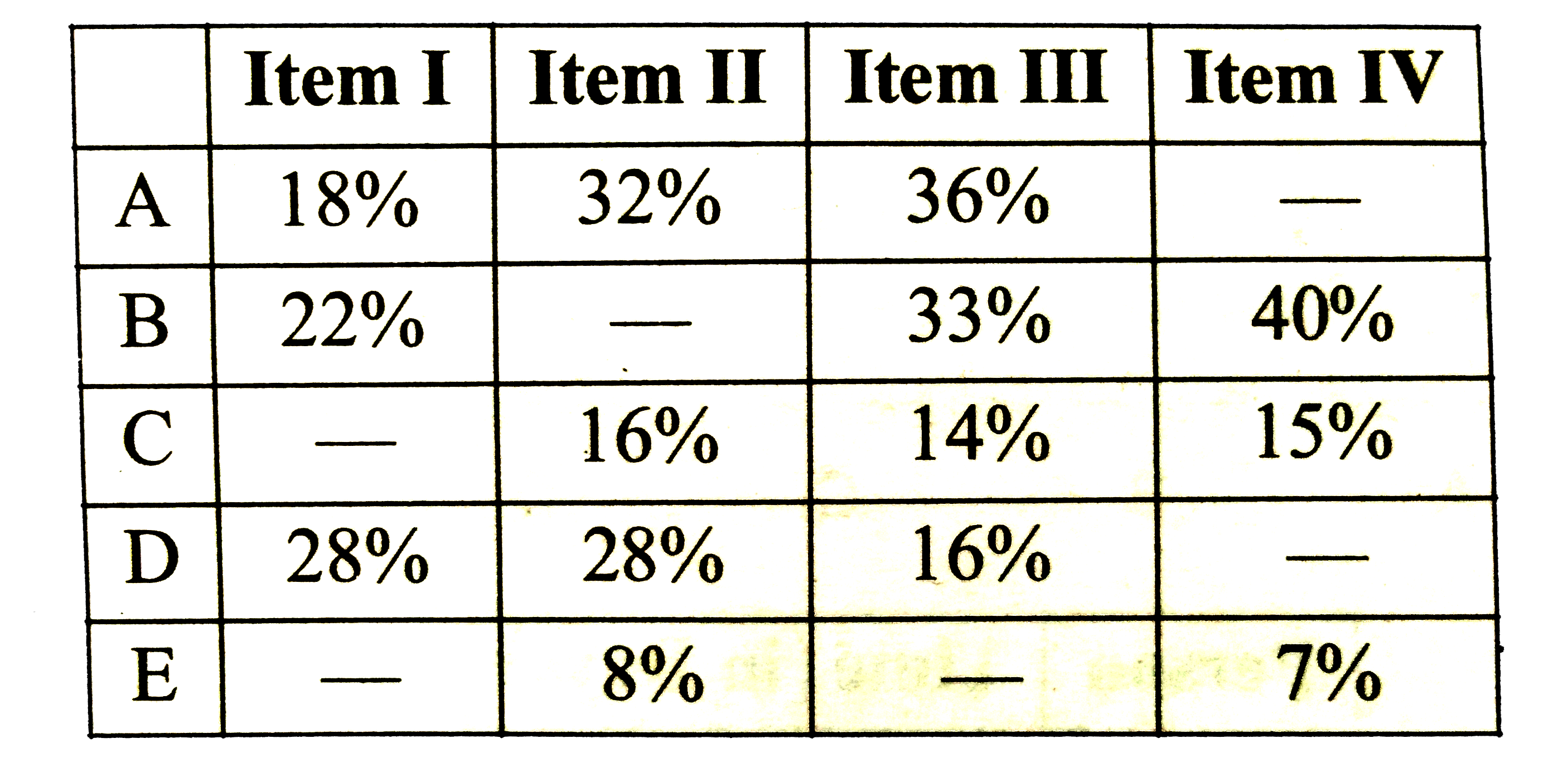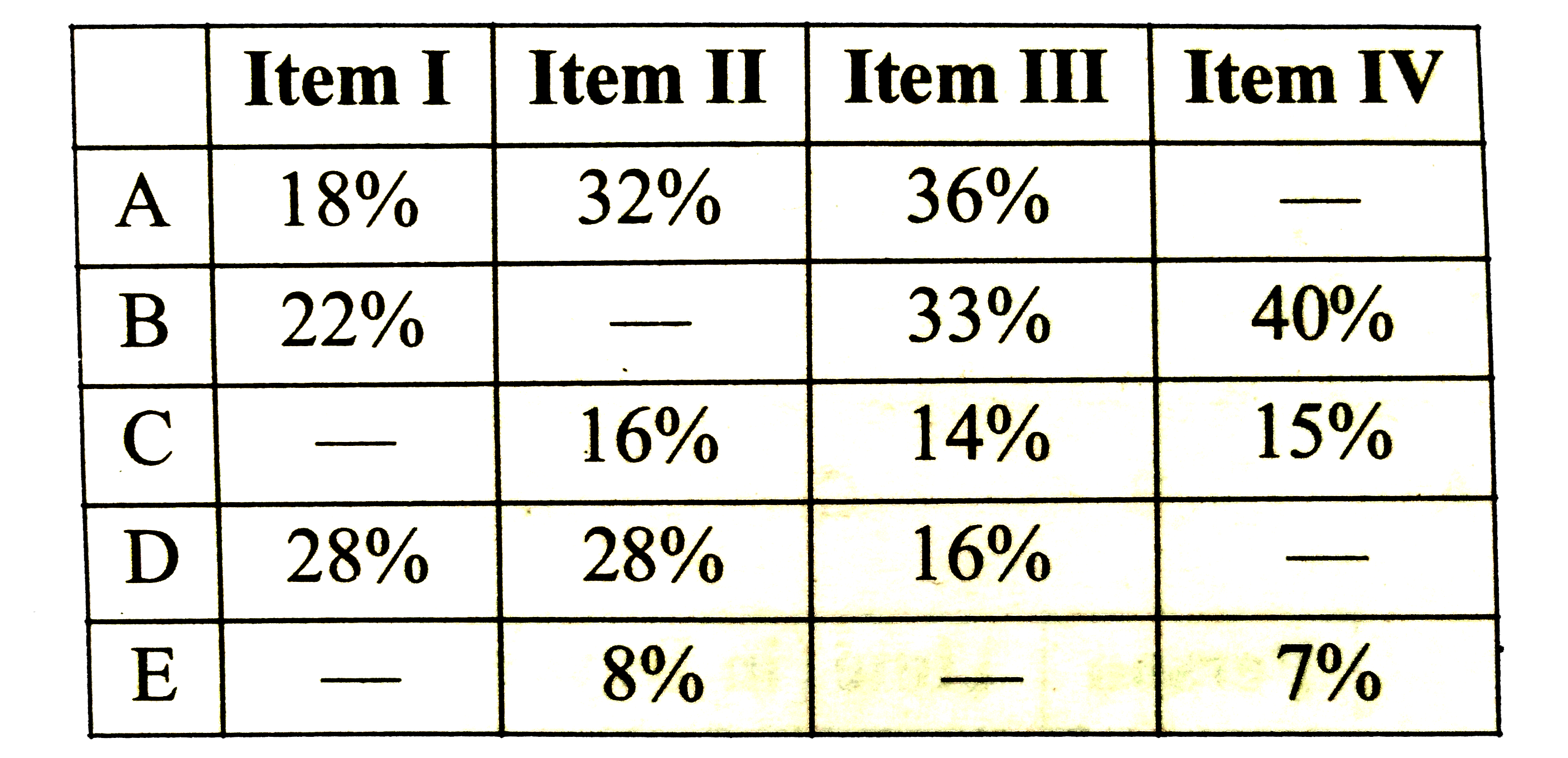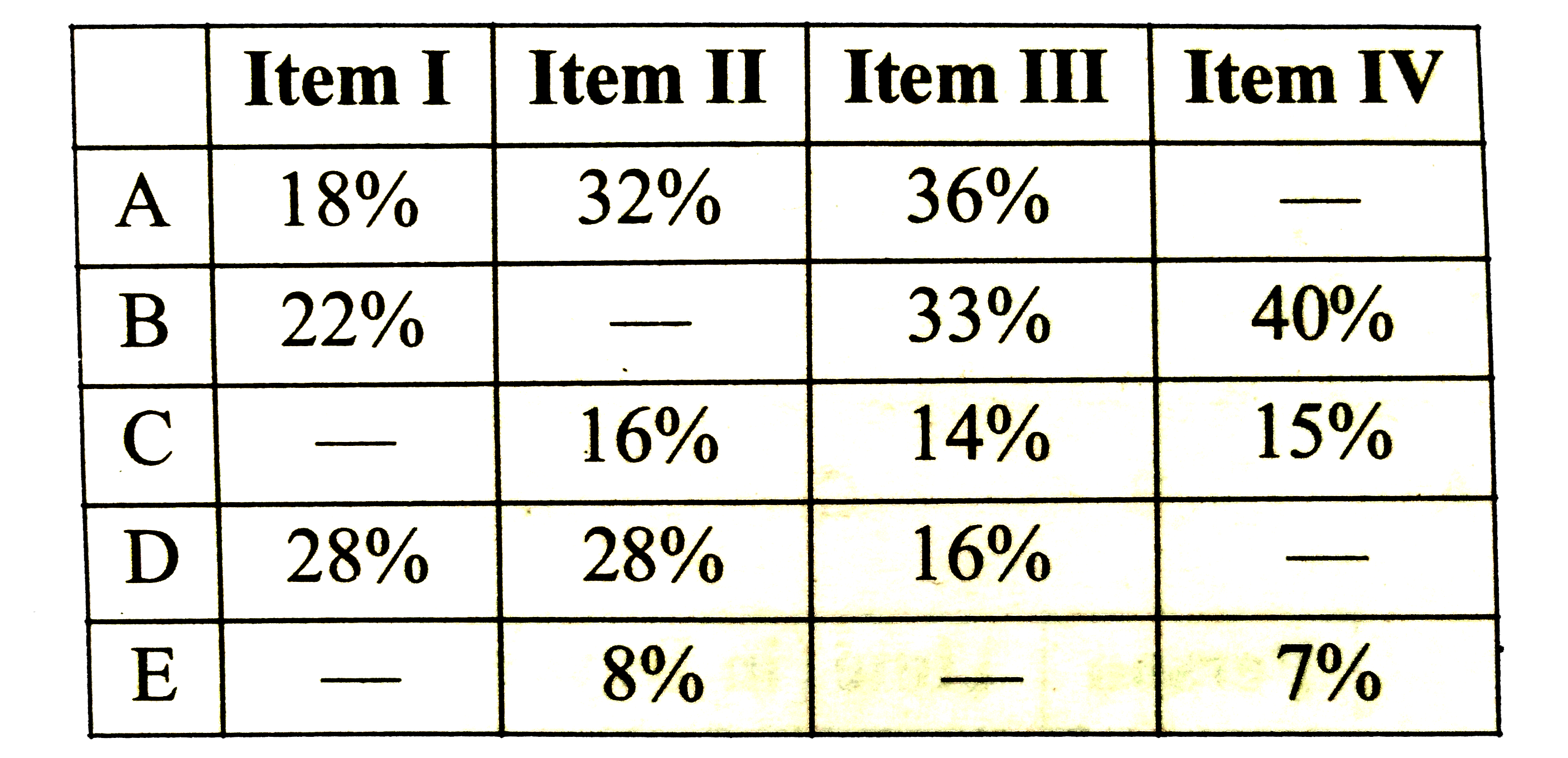
Note : Some values are missing, you have to calcaulte them accroding to question.
Note : Range of commission are in integeral values.
Shop RR sells 3 prdoduct in equal numbr (105) and equal commission percent. if their selling price (in Rupees). are 20,30 and 40. Then what is the commission percent
120027%
90027%
115027%
100027%
The correct Answer is:D
Total commission earned by Shop RR = Rs. 3500
Total selling price of Book I=105×20=Rs.2100
Total selling price Book II=105×30
= Rs. 3150
Total selling price of Books III=105×40=Rs.4200
Let commession percent =x%
(2100+3150+4200)×x100=3500=100027%
Topper's Solved these Questions
Similar Questions
In the table, Discount (as a percentage) is give on mark price of these five products by different sellers. Study the table and answer the following questions :

Note : 1 Some values are missing. You have to calculate these values as per data given in the questions.
2 Mark price of a particular item is same for all of the shop owners.
If the profit percentage of sellers A after sellin item II is s % and that of seller C of the same item is (2s−4)% and the ratio of cost price of itme II by seller A and seller C is 17:21 then find the value of s ?View SolutionIn the table, Discount (as a percentage) is give on mark price of these five products by different sellers. Study the table and answer the following questions :

Note : 1 Some values are missing. You have to calculate these values as per data given in the questions.
2 Mark price of a particular item is same for all of the shop owners.
For seller D, between the selling price of item II and that of item III is Rs. 420 if the sum of the mark price of item II and item III by the same seller is 6000 then the Mark price (in Rs) of item II is what percent more/less than that of item III by the same seller ? (Selling price of item II is greaer than that of item III) ?View Solution
Knowledge Check
- Question 1 - Select One
If the cost price of 12 books is equal to the selling price of 8 books, what is the gain percent?
A. 12%
B. 30%
C. 40%
D. 50%ADBBCADC - Question 2 - Select One
Each of the questions given below consists of a question and two statements numbered I and II given below it. You have to decide whether the data provident in the statements is sufficient to answer the question. Read both statements and-
By selling a product at 20% profit, how much profit was earned ?
I. The difference between cost price and selling price is Rs 40
II. The selling price is 120 percent of the cost price.AIf the data in statement I along is sufficient to answer the question, while the data in statement II alone is not sufficient to answer the question.BIf the data in statement II alone is sufficient to answer the question, while the data in statement I alone is not sufficient to answer the questionCIf the data in statement I alone or statement II alone is sufficient to answer the question.DIf the data in both the statements I and II is not sufficient to answer the question. - Question 3 - Select One
Directions : Read the following passage carefully, and answer the questions given below it. Certain words are printed in bold to help you to locate them while answering some of the questions.
The income disparity in the new India is massive 36 billionaires in India and 800 million people living on less than $2 a day. The challenge for achieving inclusive growth relates to the revival of agriculture. Farming is becoming a non-viable activity. A confluence of factors, from poor rainfall to the new availability of consumer goods which consume much of Indians families' incomes, has driven many farmers into crushing debt. The agriculture sector has many problems with a growth rate of less than 2% in the last decade. Further scope for increase in net sown area is limited. Disparity in productivity across regions and crops has persisted. Far from benefiting from the economic boom many complain that banks don't offer the rural poor credit, forcing them to turn to greedy money-lenders, who typically charge up to 20% interest on a four-month loan Health care and education costs have risen dramatically, while the global price of cotton has become depressed, largely due to the billions of dollars in subsidies Washington hands out to U.S. farmers.
The approach to the revival of Indian agriculture seems to be incremental, rather than a holistic strategy. It is important to stress that growth and equity should be pursued simultaneously rather than following 'growth first and equity next' approach. What are the challenges for achieving 4% growth and equity in agriculture? Policy makes like the National commission on Farmers mention cost reduction in agriculture important to compete in a globalized world.
The most important problem for the farmers is output, price fluctuations. There is a big gap between producer prices and consumers prices. In order to protect, farmers from national and international price volatility, a price stabilization fund is needed. The supply and demand side constraints have to be removed to raise growth. The support systems have to be tuned to improve productivity and incomes of farmers with emphasis on small and marginal farmers and dry land areas.
One of the differences between the green revolution in the 1960s\70s and the present second green revolution is that risk is higher in the latter approach as it has to concentrate more on dry-land areas Trade liberalization has also raised the risk and uncertainty Thus, policies have to keep in mind the increasing risk in agriculture policies have to be gender sensitive too since the share of women is increasing The Government is aware that the crop sector may not be able to grow at 4% per annum but horticulture and allied activities like dairying, poultry and fisheries have to grow at the rate 6% to 7% to achieve 4% growth in agriculture. Investment in irrigation and rural infrastructure is important for agricultural growth. It is known that the requirements needed for achieving 4% minimum growth Bharat Programme is in the right direction but the progress has to be much faster.
How does the government plan to ensure 4% growth rate in agriculture?AProviding licenses to unlicensed money lenderBShifts focus from developing agriculture infrastructure to pricing of agricultural productsCProvide subsidies equivalent to those given in the USDNone of these
In the table, Discount (as a percentage) is give on mark price of these five products by different sellers. Study the table and answer the following questions :

Note : 1 Some values are missing. You have to calculate these values as per data given in the questions.
2 Mark price of a particular item is same for all of the shop owners.
If the selling price of itme I and itme III by seller E are in the ratio of 5:6 . if the seller earned a profit of 25% which is Rs. 750 on itme I and 20% on itme IIII ten find the total profit (in Rs.) by selling itme I and item III together by the same seller ?View SolutionDirections : Read the following passage carefully, and answer the questions given below it. Certain words are printed in bold to help you to locate them while answering some of the questions.
The income disparity in the new India is massive 36 billionaires in India and 800 million people living on less than $2 a day. The challenge for achieving inclusive growth relates to the revival of agriculture. Farming is becoming a non-viable activity. A confluence of factors, from poor rainfall to the new availability of consumer goods which consume much of Indians families' incomes, has driven many farmers into crushing debt. The agriculture sector has many problems with a growth rate of less than 2% in the last decade. Further scope for increase in net sown area is limited. Disparity in productivity across regions and crops has persisted. Far from benefiting from the economic boom many complain that banks don't offer the rural poor credit, forcing them to turn to greedy money-lenders, who typically charge up to 20% interest on a four-month loan Health care and education costs have risen dramatically, while the global price of cotton has become depressed, largely due to the billions of dollars in subsidies Washington hands out to U.S. farmers.
The approach to the revival of Indian agriculture seems to be incremental, rather than a holistic strategy. It is important to stress that growth and equity should be pursued simultaneously rather than following 'growth first and equity next' approach. What are the challenges for achieving 4% growth and equity in agriculture? Policy makes like the National commission on Farmers mention cost reduction in agriculture important to compete in a globalized world.
The most important problem for the farmers is output, price fluctuations. There is a big gap between producer prices and consumers prices. In order to protect, farmers from national and international price volatility, a price stabilization fund is needed. The supply and demand side constraints have to be removed to raise growth. The support systems have to be tuned to improve productivity and incomes of farmers with emphasis on small and marginal farmers and dry land areas.
One of the differences between the green revolution in the 1960s\70s and the present second green revolution is that risk is higher in the latter approach as it has to concentrate more on dry-land areas Trade liberalization has also raised the risk and uncertainty Thus, policies have to keep in mind the increasing risk in agriculture policies have to be gender sensitive too since the share of women is increasing The Government is aware that the crop sector may not be able to grow at 4% per annum but horticulture and allied activities like dairying, poultry and fisheries have to grow at the rate 6% to 7% to achieve 4% growth in agriculture. Investment in irrigation and rural infrastructure is important for agricultural growth. It is known that the requirements needed for achieving 4% minimum growth Bharat Programme is in the right direction but the progress has to be much faster.
Which is the following is not a means to achieve 4% agriculture growth rate?View SolutionDirections : Read the following passage carefully, and answer the questions given below it. Certain words are printed in bold to help you to locate them while answering some of the questions.
The income disparity in the new India is massive 36 billionaires in India and 800 million people living on less than $2 a day. The challenge for achieving inclusive growth relates to the revival of agriculture. Farming is becoming a non-viable activity. A confluence of factors, from poor rainfall to the new availability of consumer goods which consume much of Indians families' incomes, has driven many farmers into crushing debt. The agriculture sector has many problems with a growth rate of less than 2% in the last decade. Further scope for increase in net sown area is limited. Disparity in productivity across regions and crops has persisted. Far from benefiting from the economic boom many complain that banks don't offer the rural poor credit, forcing them to turn to greedy money-lenders, who typically charge up to 20% interest on a four-month loan Health care and education costs have risen dramatically, while the global price of cotton has become depressed, largely due to the billions of dollars in subsidies Washington hands out to U.S. farmers.
The approach to the revival of Indian agriculture seems to be incremental, rather than a holistic strategy. It is important to stress that growth and equity should be pursued simultaneously rather than following 'growth first and equity next' approach. What are the challenges for achieving 4% growth and equity in agriculture? Policy makes like the National commission on Farmers mention cost reduction in agriculture important to compete in a globalized world.
The most important problem for the farmers is output, price fluctuations. There is a big gap between producer prices and consumers prices. In order to protect, farmers from national and international price volatility, a price stabilization fund is needed. The supply and demand side constraints have to be removed to raise growth. The support systems have to be tuned to improve productivity and incomes of farmers with emphasis on small and marginal farmers and dry land areas.
One of the differences between the green revolution in the 1960s\70s and the present second green revolution is that risk is higher in the latter approach as it has to concentrate more on dry-land areas Trade liberalization has also raised the risk and uncertainty Thus, policies have to keep in mind the increasing risk in agriculture policies have to be gender sensitive too since the share of women is increasing The Government is aware that the crop sector may not be able to grow at 4% per annum but horticulture and allied activities like dairying, poultry and fisheries have to grow at the rate 6% to 7% to achieve 4% growth in agriculture. Investment in irrigation and rural infrastructure is important for agricultural growth. It is known that the requirements needed for achieving 4% minimum growth Bharat Programme is in the right direction but the progress has to be much faster.
Which of the following is not true in the context of the passage?View SolutionDirections : Read the following passage carefully, and answer the questions given below it. Certain words are printed in bold to help you to locate them while answering some of the questions.
The income disparity in the new India is massive 36 billionaires in India and 800 million people living on less than $2 a day. The challenge for achieving inclusive growth relates to the revival of agriculture. Farming is becoming a non-viable activity. A confluence of factors, from poor rainfall to the new availability of consumer goods which consume much of Indians families' incomes, has driven many farmers into crushing debt. The agriculture sector has many problems with a growth rate of less than 2% in the last decade. Further scope for increase in net sown area is limited. Disparity in productivity across regions and crops has persisted. Far from benefiting from the economic boom many complain that banks don't offer the rural poor credit, forcing them to turn to greedy money-lenders, who typically charge up to 20% interest on a four-month loan Health care and education costs have risen dramatically, while the global price of cotton has become depressed, largely due to the billions of dollars in subsidies Washington hands out to U.S. farmers.
The approach to the revival of Indian agriculture seems to be incremental, rather than a holistic strategy. It is important to stress that growth and equity should be pursued simultaneously rather than following 'growth first and equity next' approach. What are the challenges for achieving 4% growth and equity in agriculture? Policy makes like the National commission on Farmers mention cost reduction in agriculture important to compete in a globalized world.
The most important problem for the farmers is output, price fluctuations. There is a big gap between producer prices and consumers prices. In order to protect, farmers from national and international price volatility, a price stabilization fund is needed. The supply and demand side constraints have to be removed to raise growth. The support systems have to be tuned to improve productivity and incomes of farmers with emphasis on small and marginal farmers and dry land areas.
One of the differences between the green revolution in the 1960s\70s and the present second green revolution is that risk is higher in the latter approach as it has to concentrate more on dry-land areas Trade liberalization has also raised the risk and uncertainty Thus, policies have to keep in mind the increasing risk in agriculture policies have to be gender sensitive too since the share of women is increasing The Government is aware that the crop sector may not be able to grow at 4% per annum but horticulture and allied activities like dairying, poultry and fisheries have to grow at the rate 6% to 7% to achieve 4% growth in agriculture. Investment in irrigation and rural infrastructure is important for agricultural growth. It is known that the requirements needed for achieving 4% minimum growth Bharat Programme is in the right direction but the progress has to be much faster.
What does the author view as a challenge for achieving inclusive growth ?View SolutionDirections : Read the following passage carefully, and answer the questions given below it. Certain words are printed in bold to help you to locate them while answering some of the questions.
The income disparity in the new India is massive 36 billionaires in India and 800 million people living on less than $2 a day. The challenge for achieving inclusive growth relates to the revival of agriculture. Farming is becoming a non-viable activity. A confluence of factors, from poor rainfall to the new availability of consumer goods which consume much of Indians families' incomes, has driven many farmers into crushing debt. The agriculture sector has many problems with a growth rate of less than 2% in the last decade. Further scope for increase in net sown area is limited. Disparity in productivity across regions and crops has persisted. Far from benefiting from the economic boom many complain that banks don't offer the rural poor credit, forcing them to turn to greedy money-lenders, who typically charge up to 20% interest on a four-month loan Health care and education costs have risen dramatically, while the global price of cotton has become depressed, largely due to the billions of dollars in subsidies Washington hands out to U.S. farmers.
The approach to the revival of Indian agriculture seems to be incremental, rather than a holistic strategy. It is important to stress that growth and equity should be pursued simultaneously rather than following 'growth first and equity next' approach. What are the challenges for achieving 4% growth and equity in agriculture? Policy makes like the National commission on Farmers mention cost reduction in agriculture important to compete in a globalized world.
The most important problem for the farmers is output, price fluctuations. There is a big gap between producer prices and consumers prices. In order to protect, farmers from national and international price volatility, a price stabilization fund is needed. The supply and demand side constraints have to be removed to raise growth. The support systems have to be tuned to improve productivity and incomes of farmers with emphasis on small and marginal farmers and dry land areas.
One of the differences between the green revolution in the 1960s\70s and the present second green revolution is that risk is higher in the latter approach as it has to concentrate more on dry-land areas Trade liberalization has also raised the risk and uncertainty Thus, policies have to keep in mind the increasing risk in agriculture policies have to be gender sensitive too since the share of women is increasing The Government is aware that the crop sector may not be able to grow at 4% per annum but horticulture and allied activities like dairying, poultry and fisheries have to grow at the rate 6% to 7% to achieve 4% growth in agriculture. Investment in irrigation and rural infrastructure is important for agricultural growth. It is known that the requirements needed for achieving 4% minimum growth Bharat Programme is in the right direction but the progress has to be much faster.
Which of the following factors should the Government take into consideration while farming agricultural policies?
(1) Allied farm activities like horticulture should receive less attention
(2) Increased participation of women in agricultural sector
(3) Reduced risking agriculture owing to globalization.View Solution

